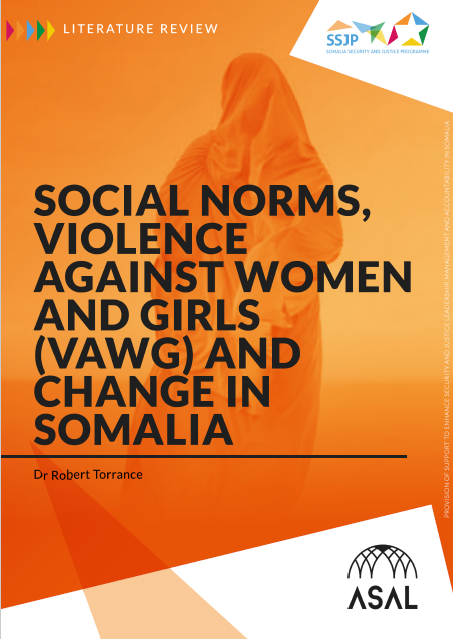Violence against women and girls (VAWG) is a pervasive issue in Somalia, with devastating and diverse consequences. Social norms in Somalia serve to perpetuate VAWG and present barriers to support and justice, but they can also protect. This literature review identifies and explores social norms that relate to VAWG in Somalia, as a component of a larger social norms mapping study.
Categories of VAWG that were most frequently discussed in the literature were sexual violence, intimate partner violence (IPV), child, early and forced marriage (CEFM) and female genital mutilation/cutting (FGM/C). Findings on these categories include:
- Social norms believed to contribute to sexual violence included the acceptance of rape as ‘normal,’ rape as a display of manhood, and rape as a form of humiliation/revenge. However, evidence points towards a prevailing social norm in Somalia that men should not commit sexual violence.
- Normative barriers to justice exist, such as the norm that sexual violence should not be discussed (cultural taboo), the expectation that women should not report rape to protect the family’s reputation, and the norm that sexual violence should be resolved by customary law (xeer).
- Whilst most Somalis view intimate partner violence (IPV) as unacceptable, many believe it is justified as a form of discipline, with some interpretations of sharia law favouring this norm. Men are less likely to abuse their wives if their mother-in-law is living with them and the cultural expectation that brothers should look after their sisters serves to protect women from IPV.
- Whilst a large proportion of girls get married early, many Somalis believe that girls should not marry until they are adults. CEFM is used as a means of safeguarding girls/women from rape and its consequences, improving a family’s financial position, and/or circumventing the shame associated with pre-marital sex.
- FGM/C is ubiquitous in Somalia with a range of cultural, religious and marital reasons central to the decision. Male preference towards women who have received FGM/C and social pressure to receive FGM/C were also found to be major contributing factors to the continuation of this practice. However, there are signs of shifting social norms related to FGM/C amongst Somalis has been recently documented, with some men stating a preference for uncircumcised women and an increasing trend towards a less extreme form of FGM/C has been recently documented.
Other forms of VAWG that remain problematic in Somalia include forcing women and girls to remain housebound, and the abandonment of women by their husbands. Further research is needed to better understand the relationship between social norms and VAWG in Somalia, to help inform the design of interventions that can effectively prevent VAWG and protect women and girls from its devastating consequences.

